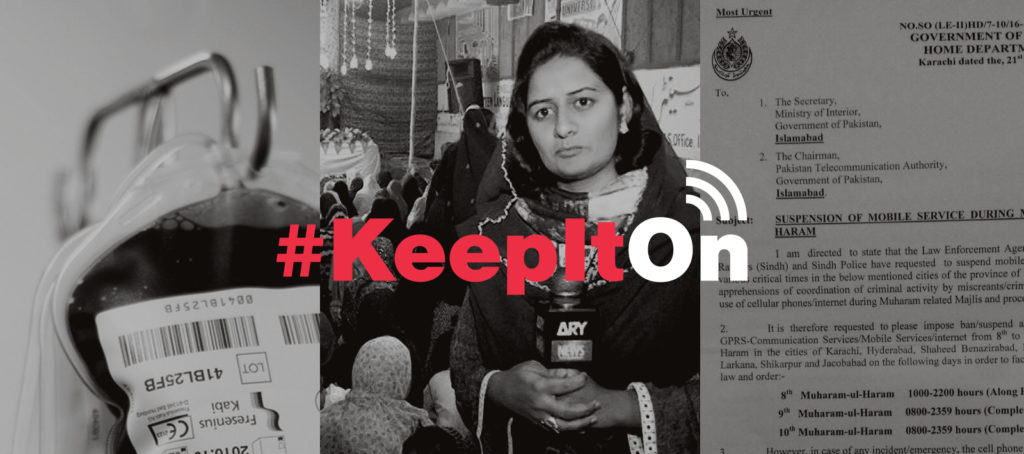According to the information we’ve gathered for our Shutdown Tracker Optimization Project, Pakistan has had at least 11 internet shutdowns in 2018 alone. Shutdowns are not new in Pakistan, but multiple shutdowns in one week is unusual. There appears to have been a different rationale for each of three shutdowns that took place last week. But regardless of the reasons for imposing them, all three did what shutdowns do: damage human rights, put people in danger, and hurt the economy.
1. A shutdown to silence protests
The first reported incident of the three began on October 28 when hundreds of Pashtun people marched towards Bannu. Organized using the hashtag #PashtunLongMarch2Bannu, the march was part of a peaceful protest by residents of Pashtun who are victims of the war on terror and extrajudicial killings, with those participating asking the government to extend equal rights to the Pashtun people. As the protestors gathered in Bannu, activists in Pakistan began reporting on social media that the government had blocked mobile phone signals. Even though this evident shutdown did not stop people from peacefully assembling to demand their rights, it facilitated what appears to be a successful media blackout of this massive gathering (see BBC coverage in Urdu).
Unacceptable for govt to block mobile phone signals in Bannu today during a peaceful gathering of young protestors as part of the #PashtunLongMarch2Bannu. #Networkshutdowns violate fundamental right to information & speech & cause more panic. @ShireenMazari1 @DrKhalidMS #KeepItOn
— Usama Khilji (@UsamaKhilji) October 28, 2018
2. A shutdown for a public holiday
The second incident took place on October 30-31, for the observance of the Chehlum of Hazrat Imam Hussain, an annual religious pilgrimage. The Pakistani government suspended mobile networks including mobile data in four provinces and autonomous territories of Pakistan, effectively disconnecting much of the country for two days. While the rest of the country was off the grid, there were partial shutdowns in Islamabad. The rationale that is often cited for shutdowns for public holidays is that they increase safety, since sometimes processions during holidays are targeted for terrorist attacks. However, deliberately cutting off channels of communication in fact blocks access to emergency services and would stop people from checking on loved ones or getting help during such an attack.
3. A shutdown to keep people off the streets
The third incident took place on November 1st. This time, the shutdown appeared to be an attempt to quiet protests and stop people from joining them. After the the Supreme Court of Pakistan issued a judgment for acquittal of Asia Bibi, a Christian woman accused of blasphemy, protests broke out in the streets of Islamabad, Lahore and other major cities. When Ms. Bibi was freed and people filled the streets, the Minister for Information and Broadcasting ordered a curfew on mobile and internet services in four major cities.
Mobile services of Lahore Pindi ISL and Gujranwala Will be blocked from 8 am till Mughrib
— Ch Fawad Hussain (@fawadchaudhry) November 1, 2018
How these shutdowns happen
Most mobile service disruptions in Pakistan come at the request of the Ministry of Interior, sometimes via tweets and other times in memos, often citing public safety and national security concerns. These three new incidents bring our count of shutdowns in Pakistan to 11 this year so far. However, it’s important to note internet shutdowns can be hard to detect and document, especially when they are partial or curfew style. It is therefore highly likely that the number of shutdowns is higher than we are able to verify.
How civil society is fighting to stop them
Pakistan’s frequent shutdowns have not gone unchallenged. Citing the problems they face in accessing information, banking, and other essential services, the residents of Islamabad petitioned the High Court of Islamabad, saying that these frequent shutdowns violate their fundamental rights to access to telecommunications and related services. This petition brought the telecommunication service providers and the federal government to the courts for the first time to justify their actions.
The High Court of Islamabad ruled in favor the plaintiff, delivering a major win in the fight to stop internet shutdowns in Pakistan, and a boost to similar legal battles worldwide. The court held that Pakistan’s policy that claims the power to order internet shutdowns on the grounds of “national security” is illegal.
On appeal to a division bench of the High Court, the court granted interim stay of the order until May 2018, allowing cellular network suspensions for the time being. The court was then scheduled to hear the case on October 29th, 2018, but according to sources in Pakistan, the court did not have time to review the case on that day.
At Access Now, we believe that broad and vague laws should not be used to authorize interference with free expression, as they often allow misuse and abuse for censorship of critical voices. It is imperative that authorities adhere to narrow standards subject to strict interpretation by impartial and independent judicial authorities, extending due process, for any and all restrictions to freedom of expression.
Your story could help stop the shutdowns
If you’re in Pakistan, any information that you share about a shutdown that you experience can strengthen the effort to show the world what is going on. It can inform global media and provide evidence for international advocacy against censorship and shutdowns in forums like the United Nations Human Rights Council.
You can use this form to tell us your shutdown story, to provide a narrative account with details on the direct impact that it has on your life. It is critically important to show the real effect of shutdowns on the people who suffer from them.
When we work together to document these incidents, we strengthen the fight to defend free expression in Pakistan and around the world, so be sure to spread the word. We are listening.
